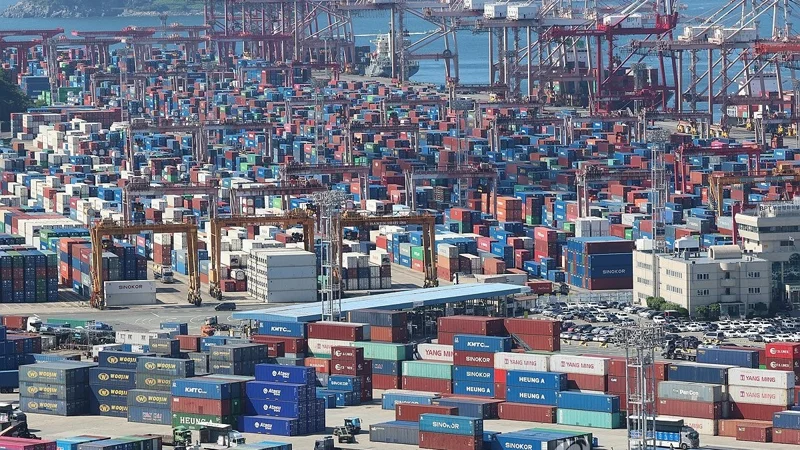S. Korea's exports rise 1.3 pct on-year in Aug. on robust chip demand: data
South Korea's exports grew 1.3 percent from a year earlier in August, despite U.S. tariff effects, thanks to strong demand for semiconductors, government data showed Monday, Yonhap reports.

Outbound shipments came to US$58.4 billion last month, rising for the third consecutive month, according to data compiled by the Ministry of Trade, Industry and Energy.
Imports decreased 4 percent on-year to $51.89 billion, resulting in a trade surplus of $6.51 billion.
Semiconductor exports jumped 27.1 percent on-year to reach an all-time high of $15.1 billion in August, driven by a sharp increase in memory chip prices sparked by the global expansion of investment in artificial intelligence (AI) infrastructure.
Auto exports increased 8.6 percent on-year to $5.5 billion won, marking the highest figure for any August, on the back of robust demand for electric vehicles (EVs) and hybrid cars.
Ship exports surged 11.8 percent to $3.14 billion, marking the sixth consecutive month of increase, while shipments of agro-fisheries products added 3.2 percent to $960 million, also the highest for any August.
Shipments of cosmetics expanded 5.1 percent to $870 million amid the global popularity of Korean culture, and exports of electronic devices climbed 5.6 percent to $1.29 billion, both the highest figures for August in history.
Exports of petroleum and petrochemical products, however, declined 4.7 percent and 18.7 percent on-year to $4.17 billion and $3.38 billion, respectively, amid global oversupply.
Shipments of displays dropped 9.2 percent to $1.65 billion, and exports of wireless communications equipment went down 14.1 percent to $1.56 billion, while secondary battery exports tumbled 31.3 percent to $490 million.
Steel exports dipped 12.6 percent to $690 million amid 50 percent U.S. tariffs on all steel imports.
By destination, exports to the United States plunged 12 percent on-year to $8.74 billion as shipments of steel, automobiles and machinery declined due to impacts of the Donald Trump administration's sweeping tariff scheme.
"It marked the first time since August 2023 Korea's exports to the U.S. came below the $9 billion mark," Seo Ga-ram, an official at the ministry said, noting that U.S. tariffs had a "big" impact.
In particular, steel exports to the U.S. nosedived 32.1 percent and auto parts exports slid 14.4 percent.
Seo said the government will work to minimize the impact of Washington's plan to introduce a stricter semiconductor export control mechanism, stripping Samsung Electronics Co. and SK hynix Inc. of "validated end-user" status, to minimize the impact of such a move on Korean chipmakers.
Exports to China fell 2.9 percent to $11.01 billion on overall weakness of export items.
Exports to the European Union went down 9.2 percent to $5.81 billion on sluggish demand for machinery, petrochemical and biohealth products.
Shipments to Japan and India also dipped 5.2 percent and 4.8 percent to $2.37 billion and $1.56 billion, respectively.
On the other hand, exports to the Association of Southeast Asian Nations (ASEAN) advanced 11.9 percent to $10.89 billion, up for the third consecutive month, driven by strong demand for semiconductors and ships.
Shipments to the Middle East rose 1 percent on-year to $1.4 billion, while exports to the Commonwealth of Independent States (CIS), which includes Russia, escalated 9.2 percent to $1.12 billion.
Exports to Taiwan surged 39.3 percent to $4.38 billion, driven by the strong performance of the semiconductor sector.
"Exports in August showed solid growth for the third consecutive month, led by our two major export items, which are semiconductors and automobiles," Industry Minister Kim Jung-kwan said.
"This achievement reflects the firm competitiveness and unwavering commitment of Korean companies to exports, despite challenging external conditions, such as U.S. tariff policies," he added, stressing that the government will continue its efforts to mitigate export risks for local companies.
Kim highlighted that the government will announce a support package this month for small and medium-sized exporters to help ease their management burdens, diversify their export destinations and boost their fundamental competitiveness.
As reported earlier, global institutions expect South Korea's economic growth to rebound to 1.8 pct in 2026.
